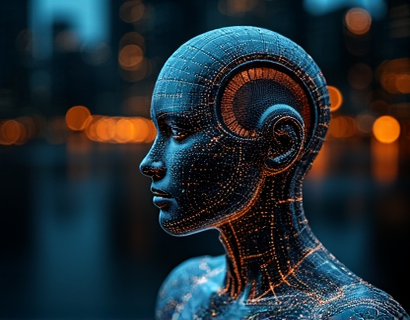AI and Crypto: Revolutionizing Digital Engagement in the Modern Ecosystem
The integration of artificial intelligence (AI) and cryptocurrency is reshaping the digital landscape, creating unprecedented opportunities for enhanced user experiences and robust connectivity within the tech ecosystem. This transformation is not merely a technological advancement but a paradigm shift that redefines how we interact with digital platforms and services. By leveraging the strengths of both AI and cryptocurrency, innovators are crafting solutions that not only streamline processes but also foster a more secure, efficient, and engaging digital environment.
The synergy between AI and cryptocurrency is multifaceted, impacting various sectors from finance to entertainment. In the realm of finance, AI-driven algorithms analyze vast datasets to predict market trends, optimize trading strategies, and enhance security measures. Cryptocurrency, with its decentralized and transparent nature, provides a robust foundation for these AI applications, ensuring transactions are secure and immutable. This combination not only boosts efficiency but also builds trust among users who are increasingly wary of traditional financial systems.
One of the most significant impacts of AI and cryptocurrency is in the area of digital identity and authentication. Traditional methods of verifying user identities are often cumbersome and vulnerable to fraud. AI-powered systems can analyze behavioral patterns and biometric data to create robust identity verification mechanisms. When paired with blockchain technology, these systems ensure that user data is secure and tamper-proof. This not only enhances user trust but also reduces the risk of identity theft and fraudulent activities.
Another critical area where AI and cryptocurrency intersect is in the development of decentralized applications (dApps). dApps leverage blockchain to provide users with greater control over their data and transactions, eliminating the need for intermediaries. AI enhances these applications by enabling smart contracts that automatically execute transactions based on predefined conditions. This automation not only speeds up processes but also reduces the potential for human error, making dApps more reliable and user-friendly.
The rise of non-fungible tokens (NFTs) is another testament to the transformative power of AI and cryptocurrency. NFTs represent unique digital assets, and AI can be used to create and manage these assets with greater precision and creativity. For instance, AI algorithms can generate unique digital art, music, or collectibles, adding a new dimension to the creative industry. Moreover, AI can help in verifying the authenticity and provenance of NFTs, ensuring that buyers and sellers have confidence in the transactions.
In the realm of customer service, AI and cryptocurrency are revolutionizing how businesses interact with their users. Chatbots powered by AI can provide 24/7 support, handling a wide range of queries and transactions in real-time. When these chatbots are integrated with cryptocurrency, they can facilitate seamless and secure transactions without the need for traditional payment gateways. This not only improves the user experience but also reduces transaction costs and processing times.
The gaming industry is also witnessing a significant transformation through the combination of AI and cryptocurrency. AI-driven game engines can create more immersive and dynamic gaming experiences, adapting to player behavior and preferences. Cryptocurrency and NFTs are used to reward players, create in-game economies, and foster community engagement. This not only enhances the gaming experience but also opens up new revenue streams for developers and players alike.
In the healthcare sector, AI and cryptocurrency are paving the way for more personalized and secure medical services. AI algorithms can analyze vast amounts of medical data to predict disease outbreaks, personalize treatment plans, and improve diagnostic accuracy. Blockchain technology ensures that patient data is stored securely and can be shared efficiently among healthcare providers, enhancing collaboration and patient care. Cryptocurrency can be used to incentivize data sharing and reward patients for contributing to medical research.
The environmental impact of AI and cryptocurrency is another area worth exploring. While both technologies have been criticized for their energy consumption, innovations are emerging to make them more sustainable. For instance, AI can optimize the energy usage of cryptocurrency mining operations, reducing their carbon footprint. Additionally, blockchain-based platforms can facilitate the trading of carbon credits, incentivizing companies to reduce their environmental impact. AI can also be used to monitor and manage natural resources more effectively, contributing to global sustainability efforts.
To fully harness the potential of AI and cryptocurrency, it is essential to address the challenges and concerns associated with these technologies. Security remains a top priority, as the integration of AI and cryptocurrency introduces new vulnerabilities. Robust security protocols and continuous monitoring are necessary to protect user data and prevent fraudulent activities. Privacy is another critical issue, as the collection and analysis of vast amounts of data raise concerns about user consent and data ownership. Transparent and user-centric approaches are vital to building trust and ensuring ethical use of these technologies.
Education and awareness are also crucial in promoting the adoption of AI and cryptocurrency. Many users are still unfamiliar with these technologies and may be hesitant to embrace them. Initiatives that provide clear and accessible information about the benefits and functionalities of AI and cryptocurrency can help demystify these concepts and encourage wider adoption. Collaborations between tech companies, educational institutions, and government bodies can play a significant role in fostering a knowledgeable and tech-savvy population.
Looking ahead, the future of AI and cryptocurrency is promising, with numerous innovative solutions on the horizon. The development of quantum computing, for example, could revolutionize both fields by enabling faster and more secure computations. AI-driven predictive analytics will become even more sophisticated, providing deeper insights and more accurate forecasts. Cryptocurrency is likely to evolve beyond digital currencies, with new applications in supply chain management, voting systems, and more.
In conclusion, the merging of AI and cryptocurrency is transforming the digital ecosystem, offering advanced solutions that enhance user experiences, drive growth, and foster connectivity. By addressing the challenges and embracing the opportunities, we can create a more secure, efficient, and engaging digital world. As technology continues to evolve, the potential for innovation and positive impact is vast, making this an exciting time for tech enthusiasts and professionals alike.










































